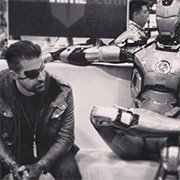Some of the best conversationalists in the world are also some of the best storytellers and it's no coincidence. Everyone loves a good story.

The quest to becoming a great storyteller takes time and practice, but there are a few simple things you can do to improve your skills right away:
- Recognize the stories you already tell.
- Make sure your stories have a beginning middle and end.
- Make sure your stories are emotional/experiential rather than technical.
- Repeat your stories.

(Source: Pixabay)
Recognize the stories you already tell.
Get yourself a story notebook. After at lunch and before bed, write down a few stories you told during a conversation.
Example: why you loved/hated a movie you saw, a story about your weekend, a story about work, a story about that place you traveled that one time.
The goal is to start recognizing what stories you already tell so that you can improve them.

Make sure your stories have a beginning, middle and end.
Next, I want you to pay attention to the way you tell stories, and make adjustments based on the following questions:
Do you feel like (or have you been told) your stories come out of nowhere?
If so then, you need to work on your beginnings. When you know you're going to tell a story add a simple beginning.
Example: The craziest experience I had in college was... The best concert I ever went to was... My favorite restaurant is... The most important lesson I learned from the book was...
Do you feel like (or have you been told) your stories make no sense?
If so, then the goal is to start recognizing why you're telling the story you're telling and get to the point. Only include the information needed to tell the story.
For example, If your story is about meeting someone interesting while traveling. Try to focus on just that the person and how you met. Only information that is relevant to this experience. It's unlikely that you need to mention the flight there, the hotel, or the flight home, or even why you traveled there if it doesn't have to do with meeting that person.
Do you feel like (or have you been told) your stories trail off?
If so, then you need to learn to end your story. The simplest way to start learning to end your stories is to add a wrap-up sentence.
For Example, if my story was about a restaurant, I might end this story: "...and that's why Dino's is my favorite restaurant." If it were about an experience at work, I might end the story: "...and that was the craziest thing my boss ever did."
Ending the story will help make it memorable and it's great for conversation because the other person will feel like it's their turn to speak.

Make sure your stories are emotional/experiential rather than technical.
When you go to the movies you want to see a story that is emotionally driven. Something that makes you feel. Something that puts you in the shoes of the people you're watching. It's the same with conversational storytelling.
We tend to get bogged down in the technical aspects of our stories.
For example, if you're going to tell a story about your favorite band, in this case let's say it's Metallica, you might tell the person, "I love Metallica because the drummer is awesome, and they have great lyrics, and their music is so intense." Even though this might all be true --you really do love the lyrics, drums, and sound -- this information only matters to people who already like the band. To someone who's never heard them before it's more like marketing for Metallica than a story.
What you want to do is express your experience with whatever you're talking about and only information relevant to the experience you're speaking about. A better version of the Metallica story would be something like this: "When I first heard Metallica it was blasting out of an auto-shop down the street, from my home. The drums felt like they were pounding on my soul. The music was so intense that I had to walk in and ask who the band was. A few hours later I owned my first album. I've been a fan ever since."
In this case, you get the information from the first attempt, but in the form of a story about my experience.

Repeat your stories
Your stories are always a work in progress. Tell them to friends, family, and new people you meet. Pay attention to how people respond.
*Do people stop paying attention at certain points? *
- *Maybe the story can be trimmed. *
*When your story ends are people asking questions? *
- Maybe there's a missing piece of info that can be added. Maybe there's a follow up story to go along with this one.
Are people sharing their own stories after?
- Maybe this is a good story to use when you want people to open up to you.
Remember, consistent practice makes perfect. So, make a habit of telling stories, refining them, and retelling them. Not only will you become a better conversationalist, you'll also get to know yourself in a whole new way!

This is a great post and I feel it adds a lot of value to the platform.
One of the things I find I struggle with is exactly this. I find that my stories tend to:
But I really appreciate this post because it puts this framework in writing and frames it as something you can work on. As with everything, it starts with awareness.So this is very helpful. Granted, I've been lucky enough to hear you speak on this topic a few times @decimus.
Thanks @ryanbaer I'll be sure to do more posts like this in the future.
With the stories that go all over the place:
Tell the story out loud and record yourself -- write the story down word-for-word and see if you can focus it on one topic. In other words, rewrite the story and memorize it again. Tell the better version next time.
Doing this, you very well may end up with multiple stories about the same topic. For example, I could say Iron Man is my favorite movie because I can empathize with Tony Stark's obsessing over his particular hobby or I could say Iron man is my favorite movie because the film inspired me to want to write screenplays. Both might be true, but I may tell the stories to different people for different reasons.
I will write more about this topic in a future post.
Great read! I can definitely make use of the emotional vs technical advice.
@martin-stuessy Glad to hear it - Thanks for reading!